Views: 3 Author: Aisha Publish Time: 2025-07-11 Origin: Site
Diamond sharpening stones have become the go-to solution for professionals who need precision, durability, and consistency. From kitchen knife manufacturers to industrial tool suppliers, more businesses are recognizing the value these stones offer in sharpening systems. If you're in the B2B space and looking to import them directly from China, you’re in the right place.
Why China? Because it’s the global production hub—delivering competitive prices, rapid innovation, and unmatched scalability. This guide isn’t your average overview—it’s built from the ground up to walk B-end clients (like you) through every practical step, highlight hidden pitfalls, and introduce you to one of China’s trusted brands—Huayida, a name synonymous with quality in the sharpening industry.
Diamond sharpening stones are precision tools made by bonding micron-sized diamonds onto flat substrates like steel or aluminum. Unlike natural stones or waterstones, diamonds don't wear unevenly or hollow out over time. This makes them indispensable in workshops, factories, and commercial kitchens.
They’re available in a wide grit range—from ultra-coarse (200 grit) for aggressive reshaping, to ultra-fine (10,000 grit) for mirror polishing. Unlike other abrasives, diamond stones cut faster, last longer, and require no flattening. Ideal for mass use in demanding environments.
Let’s face it: Chinese manufacturers dominate this category. Why?
Established Infrastructure: Decades of R&D, industrial machinery, and raw material access.
Skilled Workforce: Technicians trained in electroplating, micron bonding, and surface calibration.
Flexible Production: Whether it’s OEM, private label, or custom specs—Chinese factories adapt quickly.
Price-to-Performance: You get more for every dollar spent—especially when importing in bulk.
Before you even contact a supplier, figure out what you really need. Here's how:
Supplying retail sharpening kits?
Reselling to knife makers or metalworkers?
Supplying industrial manufacturers?
Each niche has different grit needs, base material preferences, and packaging expectations.
200–400: Coarse shaping
600–1000: Edge maintenance
3000+: Fine finishing or polishing
For multi-stone kits, many buyers combine grits (e.g., 400/1000, 1000/3000 combos).
You’ll usually choose between:
Steel plates (rigid and durable)
Aluminum (lightweight, cost-effective)
Plastic bases (for DIY kits)
The diamond layer itself can be electroplated or resin-bonded, depending on your sharpness goals.
Here’s where it gets real. Sourcing from China can be a goldmine—or a landmine.
Alibaba: Good for volume-based leads but mixed in quality.
Made-in-China: Often showcases certified manufacturers.
Global Sources: Slightly more premium listings.
Trade Shows: Best for hands-on assessment. Look for the Canton Fair or Shanghai Hardware Expo.
Here’s a B2B insider checklist:
Do they own the factory or just trade?
Are they ISO certified?
Can they offer QA reports or third-party lab tests?
Do they offer clear MOQ and lead time commitments?
Do they reply fast and professionally?
Now let’s introduce a trusted name you’ll want on your shortlist.
You’re importing for business. You don’t have time to deal with shady vendors or inconsistent quality.
Enter Huayida, one of China’s most respected manufacturers in the diamond sharpening space. What sets them apart?
In-house production: No outsourcing. Every diamond plate, every tool, is made in their own facility.
OEM-ready: They offer private labeling, branded packaging, and even grit customization.
Global footprint: Trusted by clients in Europe, Japan, North America, and Southeast Asia.
R&D-driven: Constantly improving their bonding technology and flatness tolerance.
They don’t just make stones—they help businesses like yours build brands.
Even if a supplier looks great on paper—test before you trust.
2–3 grits (low, medium, high)
Same packaging and branding you want for final products
QA documentation, if available
Use consistent edge materials (e.g., stainless kitchen knives)
Time how fast they cut
Check the flatness with a straight edge
Look for uneven wear or diamond shedding
Ask a professional sharpener to evaluate
Pro Tip: Huayida often sends detailed usage instructions with their samples. This shows professionalism and helps you assess real-world value.
Total landed cost includes:
Unit price
Packaging cost
Freight (sea or air)
Import duties
Bank fees or escrow charges
Sometimes a slightly higher unit cost from a better supplier actually saves money in the long run.
Common terms:
T/T: 30% upfront, 70% after shipping (standard)
L/C: Safer for large orders
Alibaba Trade Assurance: Extra protection for small-medium businesses
Ask Huayida about split payments and credit terms—they’re flexible for long-term clients.
Never rely on WhatsApp or vague emails. Get everything in writing.
Your purchase agreement should include:
Full specs (grit size, substrate, packaging)
MOQ and pricing tier
Delivery timeline and shipping terms
Inspection procedures
Penalty clauses for defects or late delivery
Branding/label ownership
Ask for bilingual contracts (English + Chinese) for legal backup.
Sea freight: Best for large volumes (30+ days, cheaper)
Air freight: Good for samples or emergencies (3–10 days, expensive)
Choose FOB (Free on Board) if you have a freight forwarder. Use CIF (Cost, Insurance, Freight) if you want the supplier to handle logistics.
Commercial Invoice
Packing List
Certificate of Origin
Bill of Lading
Huayida’s team can help you prepare all these correctly—they ship worldwide every week.
Once the goods land at your warehouse, inspect them before distribution:
Random sample testing
Grit comparison
Packaging inspection (logos, damage)
Quantity match
Functionality test
Create an inspection checklist based on your contract—this prevents disputes and builds accountability.
Once your first order is a success, the relationship shifts from transactional to strategic.
Increase order volume to get bulk discounts
Launch new grit lines or bundled kits
Move into premium branded stones
Co-develop packaging or online content
With HUAYIDA, many resellers evolve into exclusive regional distributors. As a trusted OEM/ODM manufacturer with years of experience in diamond sharpening solutions, HUAYIDA supports its partners with:
Competitive factory-direct pricing
Flexible MOQ to scale your business
Custom branding, packaging, and private label options
Marketing support including high-quality product images, videos, and content
Fast lead times and reliable global shipping
Partner with HUAYIDA and turn your sharpening product line into a long-term competitive advantage. Reach out today to explore exclusive distribution opportunities in your region.
| Product Picture | Product Name | Model NO. | Diamond Grit | Size(L*W*H) |
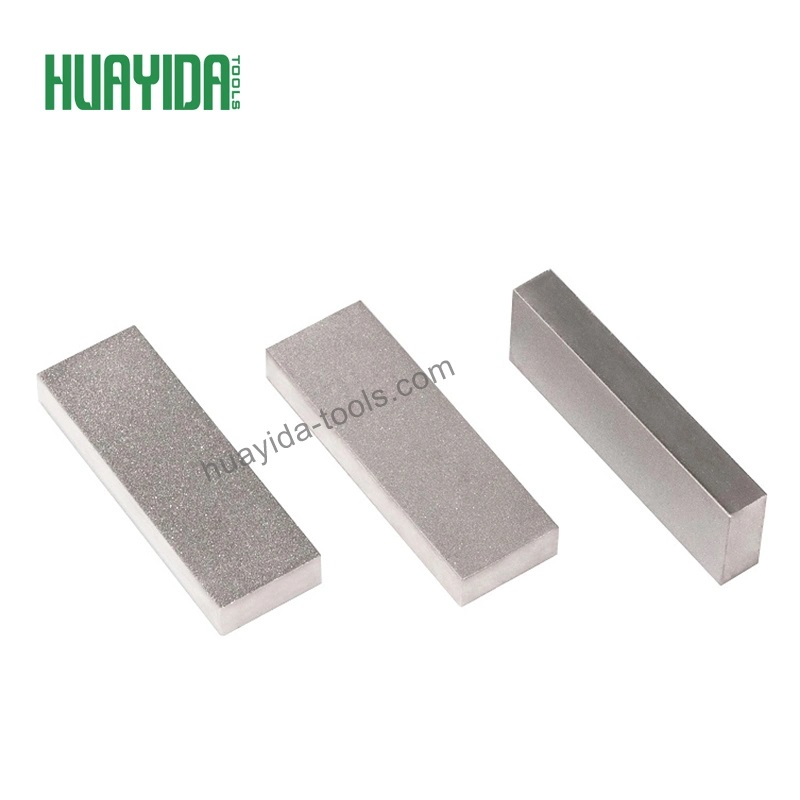 | Diamond Stones for Sharpening | 300# / 600# | 2.4"x0.8"x0.32" (60x20x8mm) | |
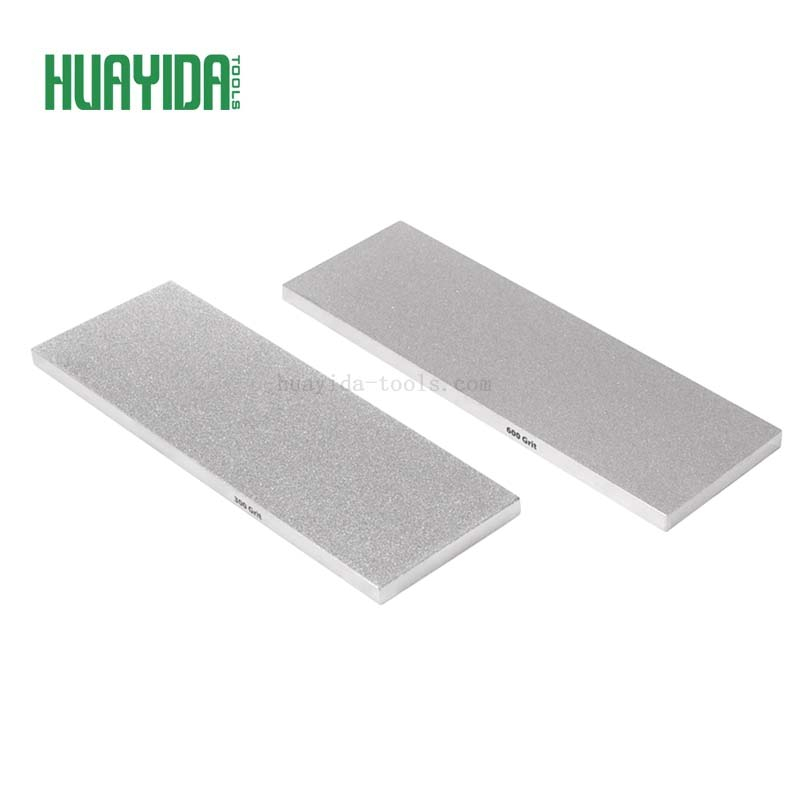 | Single Side Diamond Plate Sharpening Set (Coarse/Fine) | HYD3005-04CF | 300# / 600# | 6"x2"x0.24" (152x50x6 mm) |
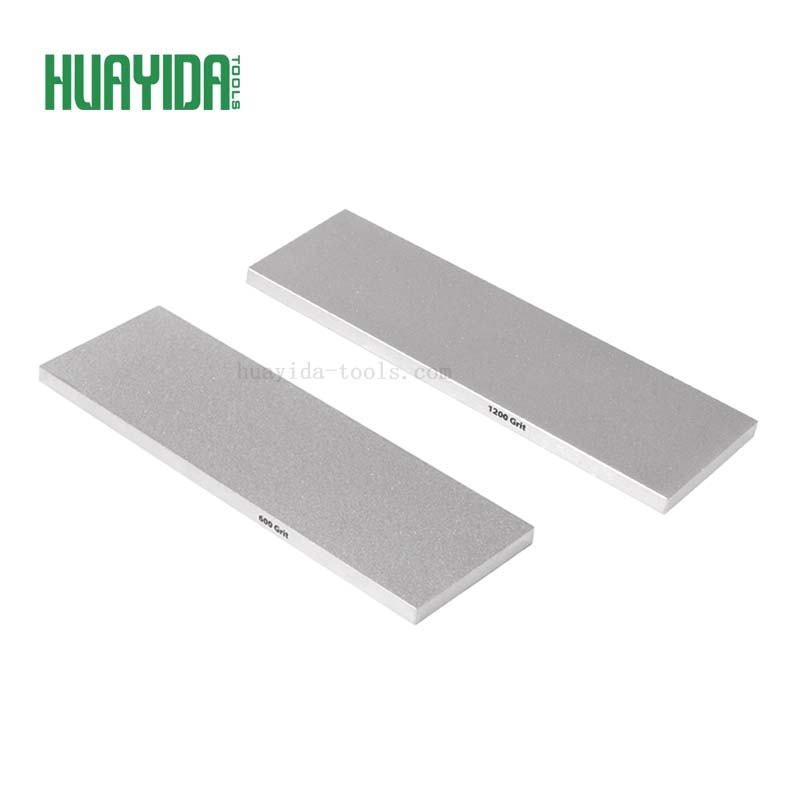 | Single Side Diamond Plate Knife Sharpener Set(Fine/Extra Fine) | HYD3005-04FE | 600# / 1200# | 6"x2"x0.24" (152x50x6 mm) |
 | Single Side Diamond Sharpener Stone Set (Coarse/Fine/Extra Fine) | 300# / 600# / 1200# | 6"x2"x0.24" (152x50x6 mm) | |
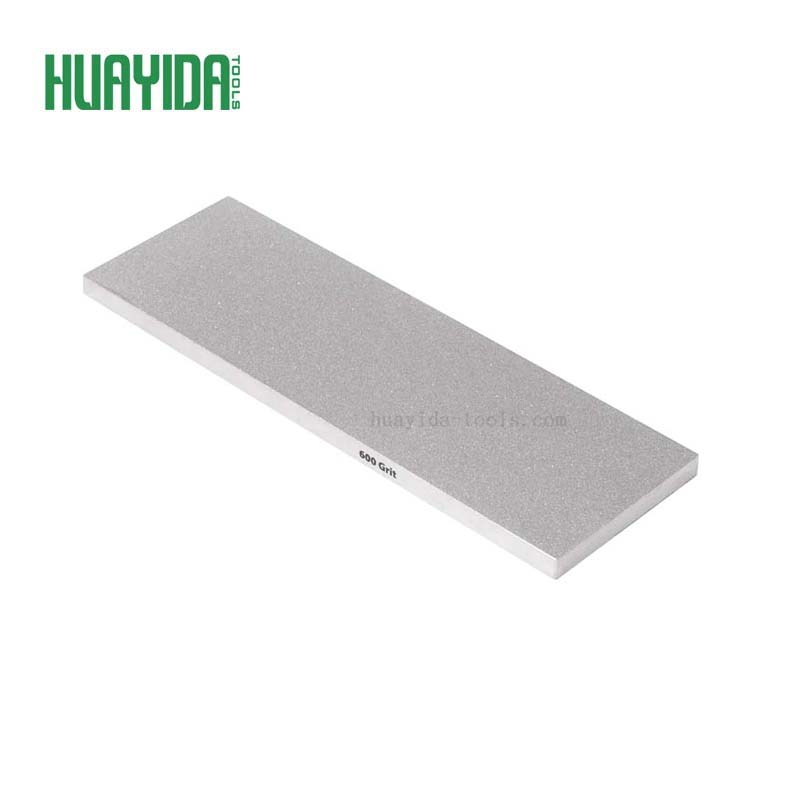 | 600 Grit China Diamond Sharpening Plates | HYD3005-04F | 600# | 6"x2"x0.24" (152x50x6 mm) |
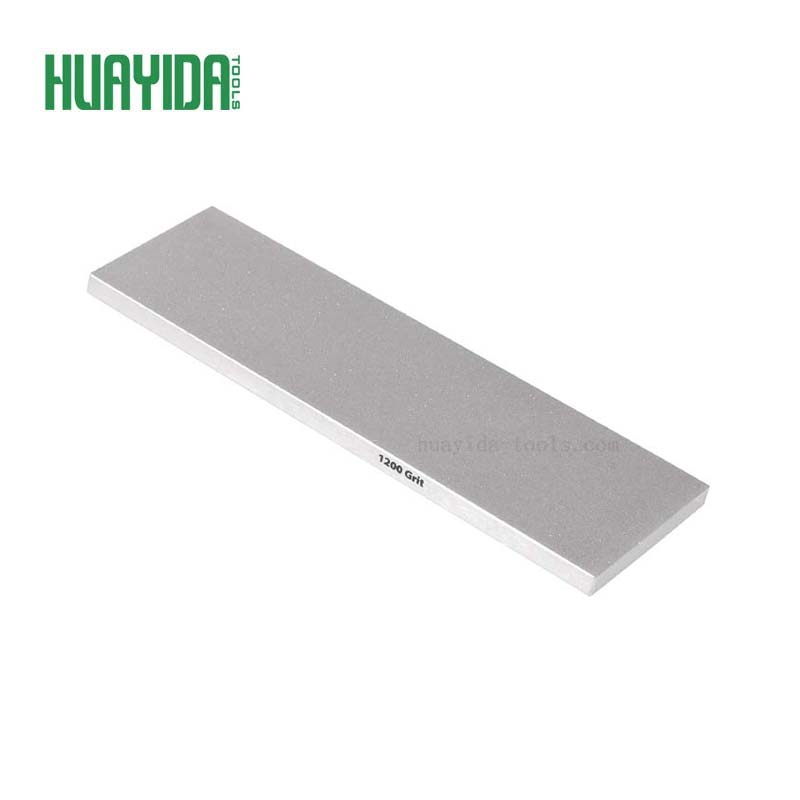 | 1200 Grit Single Side Knife Sharpening Diamond Plate | HYD3005-04E | 1200# | 6"x2"x0.24" (152x50x6 mm) |
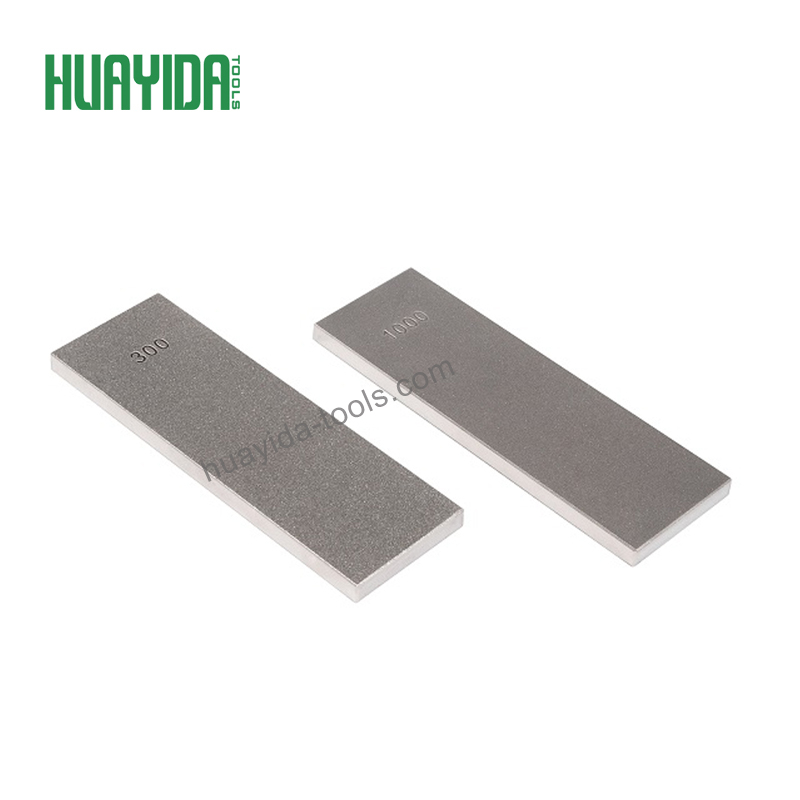 | Double Sided 300 1000 Diamond Sharpening Plate | 300#/1000# | 6"x2"x0.32" (152x50x8 mm) | |
 | Double-Sided Diamond Sharpening Plate for Chisels | 300#/1000# | 7"x2.5"x0.31" (178x65x8 mm) | |
 | Single Side Sharpening Stone Diamond | 400#/1000# | 8"x2.5"x0.31" (205x65x8 mm) | |
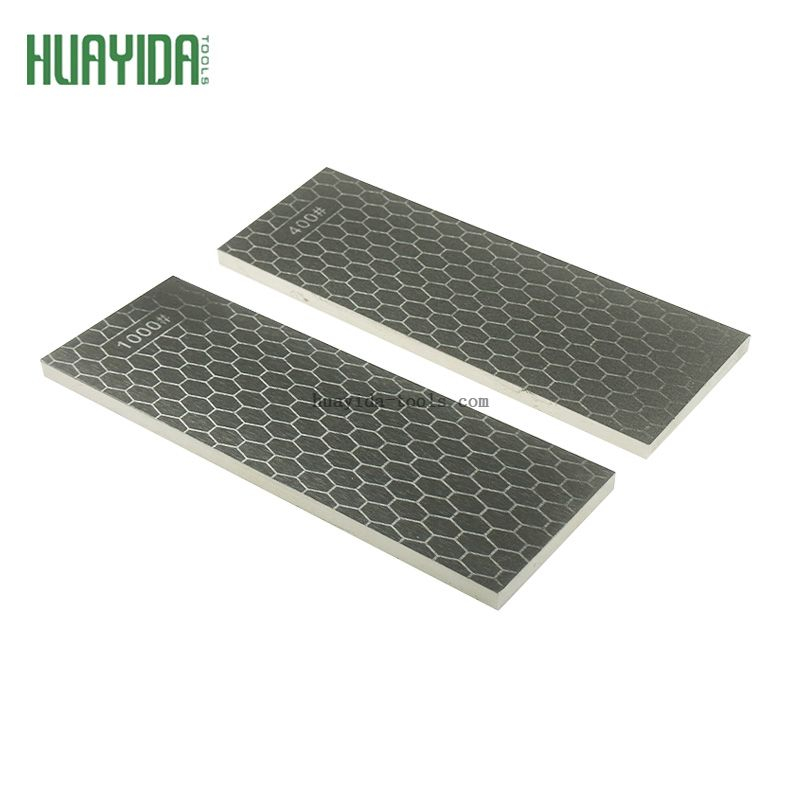 | Diamond Chisel Sharpening Stone | HYD3005--08-4F1F | 400#/1000# | 8"x2.8"x0.31"(203x70x8 mm) |
 | Single Side Plated Diamond Ssharpening Stone (Coarse/Fine) | HYD3005-8CF | 300# / 600# | 8"x3"x0.31"(205x75x8 mm) |
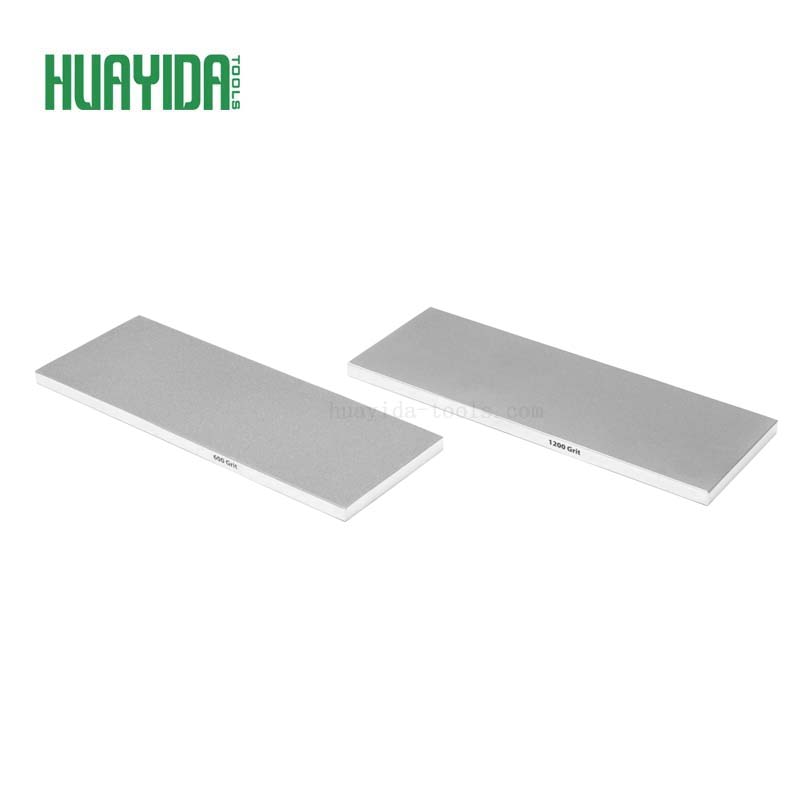 | Single Side 3 Piece Diamond Sharpening Bench Stone Set | HYD3005-8FE | 600# / 1200# | 8"x3"x0.31"(205x75x8 mm) |
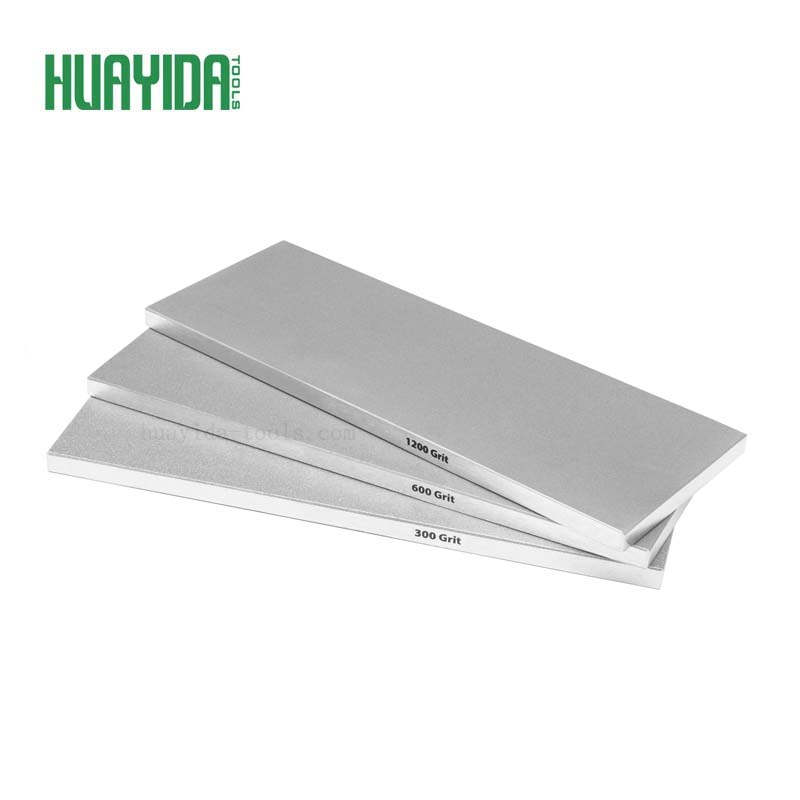 | Single Side Diamond Plate Sharpening Set | HYD3005-8CFE | 300#/600#/1200# | 8"x3"x0.31"(205x75x8 mm) |
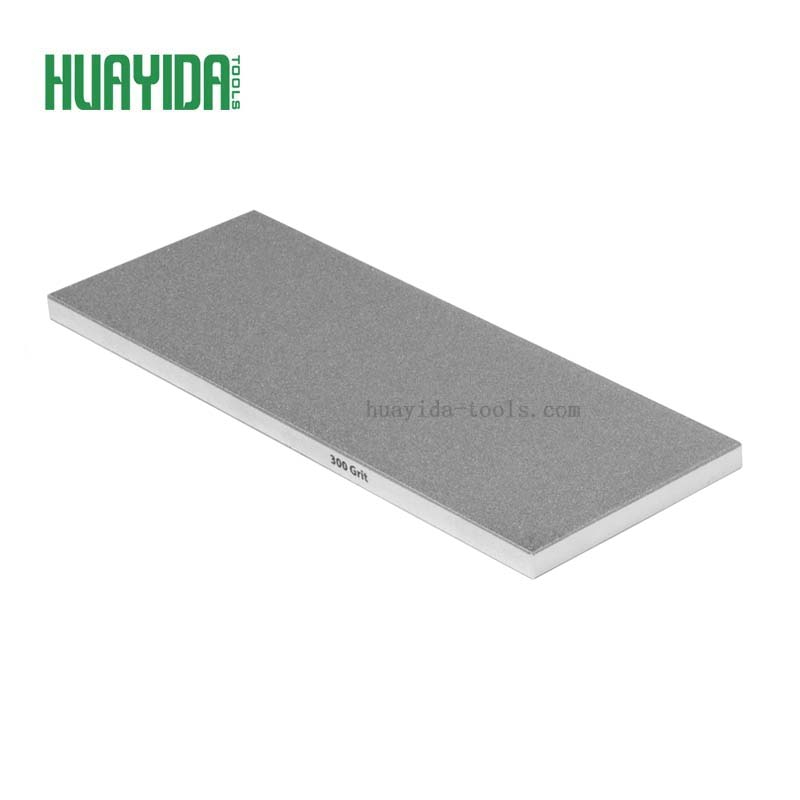 | Single Side Cheap Diamond Sharpening Stones | HYD3005-8C | 300# | 8"x3"x0.31"(205x75x8 mm) |
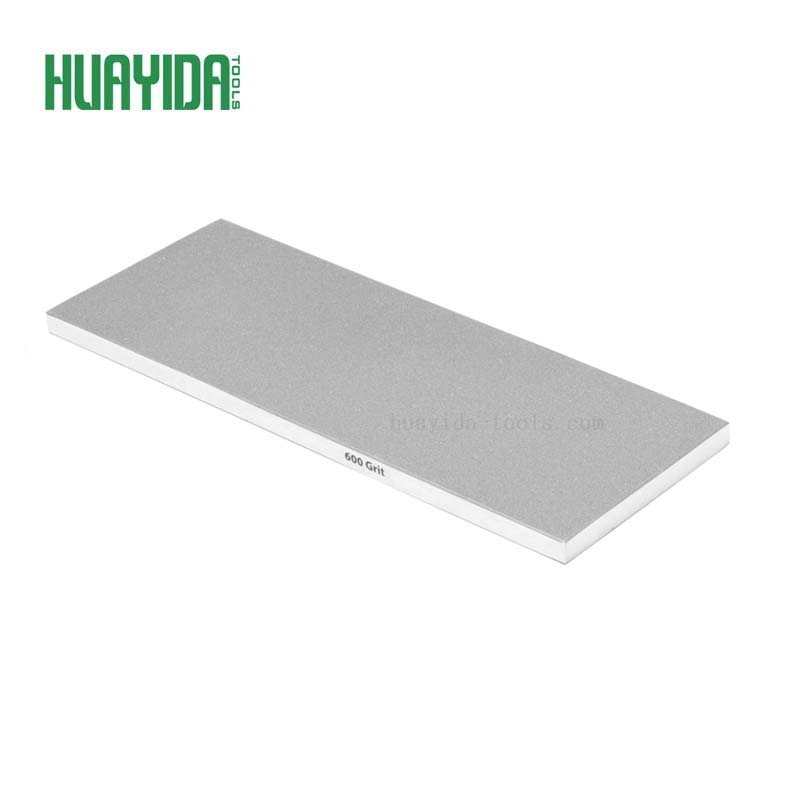 | Single Side 600 Grit Diamond Sharpening Stone | HYD3005-8F | 600# | 8"x3"x0.31"(205x75x8 mm) |
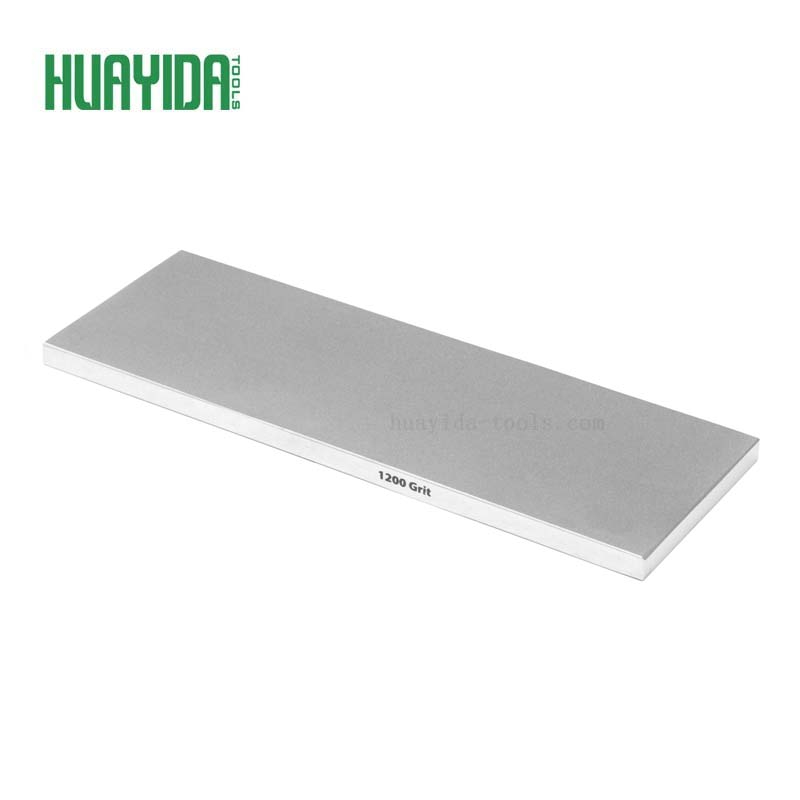 | Single Side 1200 Grit Diamond Sharpening Stone | HYD3005-8E | 1200# | 8"x3"x0.31"(205x75x8 mm) |
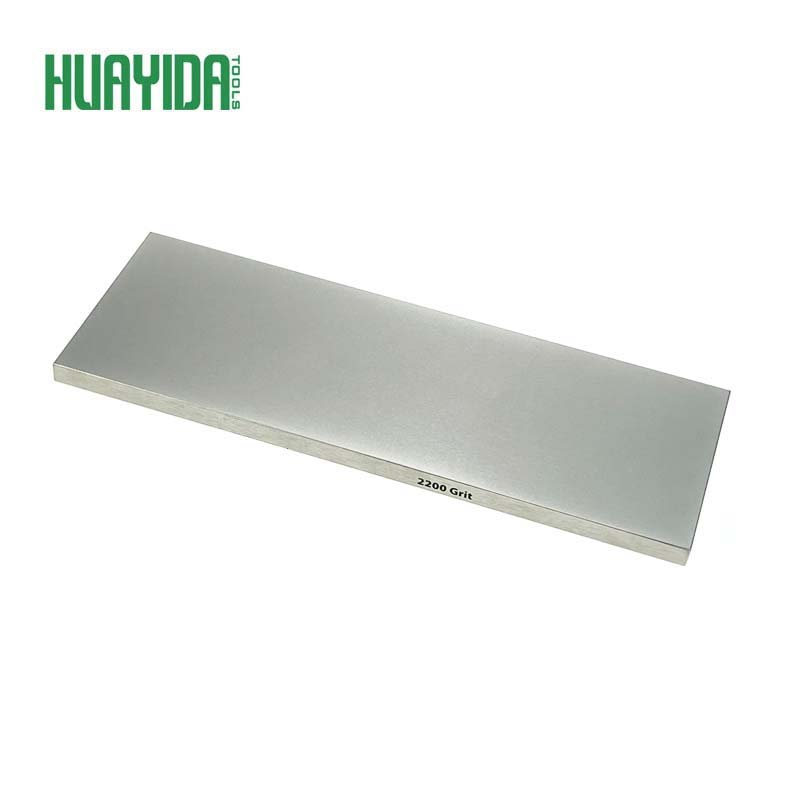 | Diamond Sharpeners 2200 Grit | HYD3005-8EF22 | 2200# | 8"x3"x0.31"(205x75x8 mm) |
 | 3000 Grit Diamond Sharpening Stone | HYD3005-8EF30 | 3000# | 8"x3"x0.31"(205x75x8 mm) |
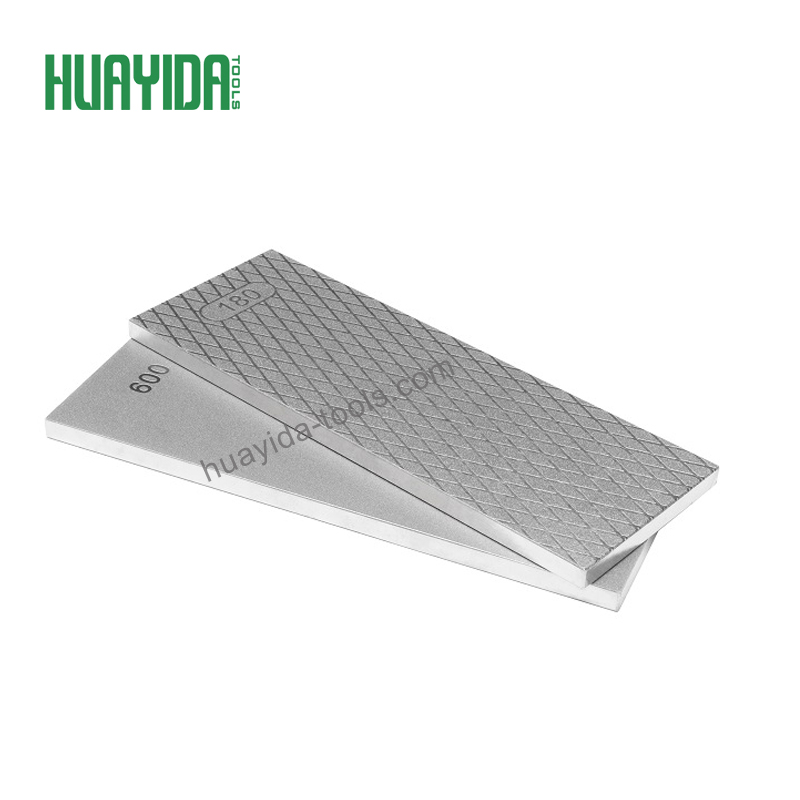 | Double Sided Damond Stone Sharpening | HYD3005--08-18W6P | 180# / 600# | 8"x3"x0.31"(205x75x8 mm) |
 | Double Sided Diamond Whetstone Sharpening Stone | HYD3005--08-3W1P | 300#/1000# | 8"x3"x0.31"(205x75x8 mm) |
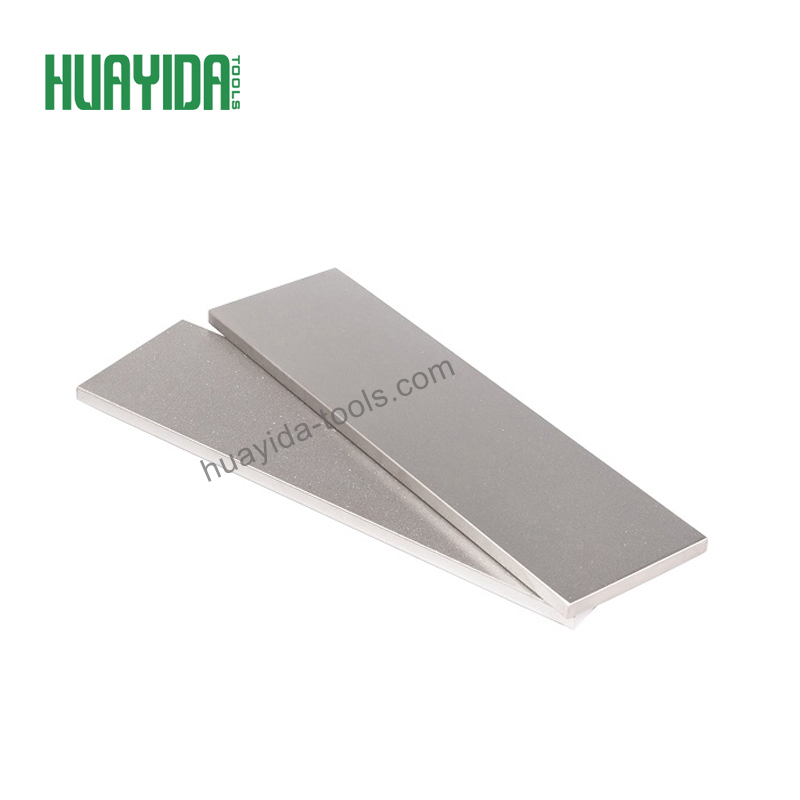 | Diamond Knife Sharpening Stones | HYD3005-09-3P1P | 300#/1000# | 11"x3"x0.31" (260x75x8mm) |
Skipping sample testing
Rushing into full orders after a single quote
Ignoring packaging and branding details
Failing to add inspection clauses
Using unknown freight partners
Every mistake above costs real time, money, or your reputation.
One U.S.-based entrepreneur started importing 500 sharpening stones per quarter from Huayida. Within 12 months, they launched their own Amazon store and signed deals with two hardware store chains. Thanks to private labeling and Huayida’s reliable quality, they scaled to 15,000 units annually—building a $300K product line in just under 2 years.
Importing diamond sharpening stones from China is not just a buying decision—it’s a growth opportunity. Don’t treat it like a short-term transaction. Build relationships, invest in quality, and work with manufacturers who understand your goals.
If you’re serious about launching or expanding your tool business, Huayida is more than a vendor—they’re a long-term growth partner.
Q1: How do I verify if a supplier is a real manufacturer?
Ask for business licenses, factory photos, production videos, and third-party inspection options. Use a sourcing agent if unsure.
Q2: What's the best grit combo for professional users?
A 400/1000 and 3000/8000 set covers most sharpening needs from edge reshaping to fine polishing.
Q3: Can Huayida offer packaging with my logo?
Yes. They offer full OEM and white-label support, including branded boxes, sleeves, and labels.
Q4: What's a good MOQ to start with?
Most suppliers start at 500–1000 units. Huayida offers flexibility for test batches with branding.
Q5: How can I avoid shipping delays?
Plan at least 60–90 days in advance, especially around Chinese New Year or major export holidays.
content is empty!
Contact Us